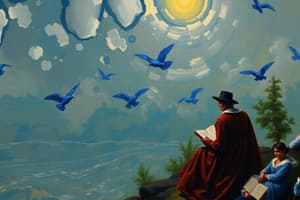Podcast
Questions and Answers
Which statement about a novel's three major types of conflict is accurate? (Select all that apply)
Which statement about a novel's three major types of conflict is accurate? (Select all that apply)
- A conflict usually takes the place of a novel's theme.
- All three can be present in the same novel. (correct)
- Person against person is the most common conflict.
- One type of conflict tends to override another one.
What happens the first time Buck is beaten?
What happens the first time Buck is beaten?
- He learns he has to obey men, but decides never to surrender inside. (correct)
- He learns that he can't get away with stealing another dog's food.
- He swears that he'll someday have his revenge on Spitz.
- He has his spirit as well as his body crushed.
The term racial unconscious means that:
The term racial unconscious means that:
- We're all prejudiced to some degree, even though we're unaware of it.
- You must learn the law of club and fang to survive.
- Nature weeds out the weakest and unfit.
- Each species and culture share ancient memories, stored in the unconscious part of the mind. (correct)
Second person stories tend to make the reader a/an:
Second person stories tend to make the reader a/an:
Generally speaking, novels have:
Generally speaking, novels have:
As a general rule, really great novels contain:
As a general rule, really great novels contain:
Stories within novels are often referred to as:
Stories within novels are often referred to as:
Which of the following books would most likely be written in first person?
Which of the following books would most likely be written in first person?
Which statement about a novel's theme is correct?
Which statement about a novel's theme is correct?
The use of first, second, or third person is known as an author's:
The use of first, second, or third person is known as an author's:
What does Buck often dream of as he sleeps by the campfire?
What does Buck often dream of as he sleeps by the campfire?
Horror, fantasy, and comedy are all _______ of novels.
Horror, fantasy, and comedy are all _______ of novels.
Typically, books written in third person:
Typically, books written in third person:
Which statement about a novel's setting is correct?
Which statement about a novel's setting is correct?
The purpose of the expedition Buck takes with Thornton and his partners is to:
The purpose of the expedition Buck takes with Thornton and his partners is to:
The side characters in novels tend to:
The side characters in novels tend to:
What pronouns are most likely to be used in second person writing?
What pronouns are most likely to be used in second person writing?
On page 14 of The Call of the Wild, what's meant by the phrase 'The domesticated generations fell from him'?
On page 14 of The Call of the Wild, what's meant by the phrase 'The domesticated generations fell from him'?
Which statement about a novel is accurate?
Which statement about a novel is accurate?
If a novel includes clues and detectives, it's most likely a:
If a novel includes clues and detectives, it's most likely a:
Flashcards are hidden until you start studying
Study Notes
Types of Conflict in Novels
- Novels can encompass three major types of conflict, usually coexisting within the narrative.
- Types include person against person, person against nature, and person against self.
Buck's Transformation
- Buck learns obedience to humans after being beaten but refuses to surrender his spirit.
Racial Unconscious
- The concept indicates that species and cultures share ancient, collective memories in the unconscious mind.
Second Person Perspective
- Second-person narratives involve the reader as a character in the story, creating a direct engagement with the text.
Novel Characteristics
- Novels typically have multiple settings, which add depth to the story.
- Great novels often convey universal truths rather than focusing solely on one main conflict.
Story Structure and Terms
- Stories within novels are termed as subplots, contributing to the overall narrative complexity.
Narrative Point of View
- The choice of narrative perspective (first, second, third person) is known as the narrative point of view, influencing the reader’s connection to the story.
Setting Importance
- The setting of a novel can be as crucial as character development, often impacting the narrative's atmosphere and context.
Subgenres of Novels
- Novels can be categorized into various subgenres such as horror, fantasy, and comedy.
Side Characters
- Side characters in novels are generally well-developed, having their own backgrounds and story arcs.
Buck's Primitive Dreams
- One of Buck's recurring dreams involves primitive man, reflecting his instinctual nature and connection to wildness.
Purpose of Expeditions in Novels
- Expeditions, such as Buck's journey with Thornton, typically aim to discover resources like gold, driving the plot forward.
Clues in Mysteries
- Novels featuring clues and detectives are typically categorized as mystery novels, engaging readers in solving the story's central puzzle.
Themes in Novels
- Novels generally explore multiple themes more profoundly than shorter writings, allowing for greater complexity.
Second Person Pronouns
- In second-person narratives, pronouns like "you" and "yours" are predominantly used, enhancing reader immersion.
Buck's Loss of Civilization
- When described as "the domesticated generations fell from him," it signifies Buck's shedding of his civilized traits in favor of primal instincts.
Reader Engagement
- The narrative voice impacts how a reader experiences the plot, with third-person narratives often providing insight into the thoughts and feelings of all characters.
Studying That Suits You
Use AI to generate personalized quizzes and flashcards to suit your learning preferences.




